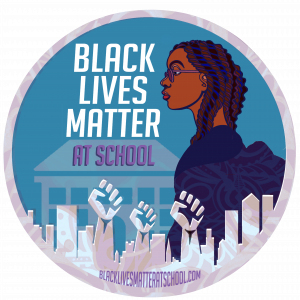Garfield’s 2023 Black Lives Matter at School Week
 Principal Hart sent families the following email with information about Garfield’s 2023 Black Lives Matter at School Week (Feb. 13-17). The week includes an altered bell schedule.
Principal Hart sent families the following email with information about Garfield’s 2023 Black Lives Matter at School Week (Feb. 13-17). The week includes an altered bell schedule.
(Check this page for the accompanying Spirit Week activities.)
Good morning,
- This week the Garfield Community is celebrating Black Lives Matter At School Week.
- Black Lives Matter at School is a national coalition organizing for racial justice in education that started in Seattle in 2016. https://www.blacklivesmatteratschool.com/
- Black Lives Matter Week at Garfield is sponsored by the Black Student Union and the Racial Equity Team.
- To help facilitate discussions, students are participating in Affinity Groups during mini summits for 45 minutes three days this week. An explanation of the intent of Racial Affinity Groups is included below.
- Students should participate in classroom activities/discussions that connect to the themes of the week.
- The week will end with a whole school assembly on Friday.
- Students who wish not to participate in an Affinity Group should meet in the Commons during the mini summits.
This is our first-time since the onset of Covid to host Black Lives Matter in School Week with mini summits. We have already identified ways to better communicate the intention of the week and to provide more guidance to ensure thoughtful, reflective, and honest discussions around race and equity. The use of Racial Affinity Groups was intentional, and we recognize the pros and cons to this model of grouping. We have gathered feedback from students who don’t feel comfortable choosing one racial identity, we recognize our need to provide a safe space for these students to participate in discussions.
As we constantly work to strengthen our school community, we are always receptive to new ideas and feedback, particularly from our students. We will continue to seek and center student voice in truly building “One Garfield.”
What are Racial Affinity Groups *
Racial Affinity Groups offer a structure of inquiry and can address many needs. They support us in exploring what has been forbidden, forgotten, and unhealed. For example, in Racial Affinity Groups, white people can discover together their group identity. They can cultivate racial solidarity and compassion and support each other in sitting with the discomfort, confusion, and numbness that often accompany white racial awakening. They can also discern white privilege and its impact without the aid of or dependence on People of Color (POC). White people who have formed Racial Affinity Groups report that they recognized their collective commonality and shared history, as well as the impact that their privilege has had on other races and on each Racial Affinity Group member.
While many POC may not need an affinity group to help them relate to their racial group membership, they may need to explore the diversity that exists among POC and across POC without having the distraction of having to educate white people on whiteness and its harm. A habitual focus on white people can distract POC from knowing themselves as a diverse body. Exploring this tender territory in a Racial Affinity Group can be a wholesome alternative to expecting white people at large, who often are not aware of being racial beings, to relieve the intense distress experienced by POC.
In a Racial Affinity Group, whether for POC or for whites, we have the opportunity to share our experiences and histories, examine our impulses, reinterpret meaning, and see clearly our role in racial harming and healing. Such groups support us in being more vulnerable and in grieving the ignorance, shame, and disgrace that often accommodate racial inquiry.
A Racial Affinity Group brings us into clear intention and is a critical step in developing, from the inside out, racial intimacy, literacy, and skillfulness. To separate into same-race groups, in this sense, is not intended to divide us but rather to leverage the fact that, in relative reality, we are racially divided. In a Racial Affinity Group, we use separation to more deeply understand this conditioning.
Racial Affinity Groups are fundamental to transforming habits of harm and to healing racism. Regardless of how you identify racially, no one is exempt from the need to intimately examine racial conditioning.
* Excerpted and adapted from Mindful of Race: Transforming Racism from the Inside Out (King, 2018).
In partnership,
Principal Hart

